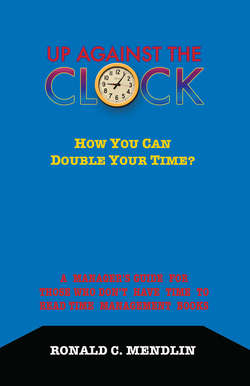Читать книгу Up Against The Clock: How You Can Double Your Time? - Ronald C. Mendlin - Страница 9
На сайте Литреса книга снята с продажи.
ОглавлениеIntroduction
Your Life and Time
“The secret of success is constancy of purpose.”
— DISRAELI
Time, time, time!!! Your success in life will largely be the result of how you organize and utilize your time.
There is so little of it, and yet we must make the most of it. It’s our most precious resource, but so few of us know how to use it wisely. Too few people realize that their spare time can be many times more valuable than gold.
EVERYONE gets 365 days a year, and 24 hours in each day which means that there are 1,440 minutes in a day, 168 hours in a week, and 8,760 hours in a year. If each week you work 40 hours, sleep 56 hours, eat for 21 hours, and devote 14 hours for recreation, you still have 37 hours to spare. What will you do with them?
Suppose you want to learn about a subject. If you spend 20 hours researching or studying, you’ll know more about that subject than most people. It’s also been said that if you spend one hour each day learning about a given company, you could be president of that company in five years’ time. So, simply put, today is yesterday’s plans put into action.
This book contains guidelines for using time well. With over 35 years of involvement with management and training I believe I have learned some things, and I want to tell you about them (though the telling will not take over 35 years!).
A BALANCING ACT
“It isn’t changing around from place to place that keeps you lively. It’s getting time on your side. Working with it, not against it.”
– URSULA LE GUIN (FROM THE DISPOSSESSED)
What does it mean to “get time on your side”? Getting time on your side involves striking a dynamic balance. Time is precious and limited, but it serves little purpose to become obsessive about it. As a general rule, you should not put off until tomorrow what you can accomplish today, but it is equally important not to try and cram every possible thing into an hour or a day. You need breathing space. Eating well and getting proper sleep are absolutely essential to making the best use of your time, but you can also take advantage of insomnia once in a while to get a few things done.
Ultimately, the key ingredients of effective time management are attitude and organization and analyzing. Everything in this book proceeds from these three principles.
ANALYZING
You set up an organizational system that can save time, money and energy. You have the right attitude, and it does not work. Your next step is to analyze why it did not work. Note: So many people analyze a problem to death. Use a moderate amount of thinking, try something. It is easier when you get feedback.
A STREAMLINED ATTITUDE
Debra, who has owned and managed a successful restaurant for over a decade, used to be at odds with time. Now she works with time, not against it. “I used to imagine that eventually, if I crossed enough items off of my to-do list, I’d be finished, and then I’d get to relax. But now I’ve realized there’s no such thing as ‘getting it all done.’ At least not until I’m dead!”
“I used to be in a constant state of panic because I could never finish. But I’ve come to accept that the list never ends. If I just keep doing things at a reasonable pace, though, it’s all going to be okay. And that’s the important thing.” Debra understands that in mastering her attitude, she is able to “enjoy the ride” with time.
“You’re always on a learning curve. Not only is your list never done, but you will never arrive at being good enough, fast enough, smart enough, and that’s a good thing! That’s not a bad thing, as long as you’re always getting a little better, and you can see what you’ve learned. I don’t think anyone really gets to the place where they can say, ‘Now I’m a good manager and I know all the tricks.’”
“Life is like rapids. There are moments where you stop and say ‘Hmm, that was good,’ and you enjoy those moments, but there’s always another rapid coming. It’s always something, whether it’s your personal life, or the business climate, or your own job skills, or politics, or the weather. It’s always something. The process itself is it, is life. There is no arrival.” Debra understands that a good relationship with time is grounded in acceptance, not just of time, but of herself.
Sometimes you will make mistakes. As the saying goes, “He who never makes a mistake never makes anything.” But never punish yourself. Forgive yourself quickly for your mistakes. (They were, after all, mistakes.) Above all, don’t let the past become a burden. What’s done is done. Don’t get mired in regrets or guilt. You can’t change the past, but your choices in the present will sow the seeds of the future. Give yourself credit for everything you learn, and for all you accomplish. Be good to yourself, and to those around you. Believe it or not, these are all important principles of time management.
